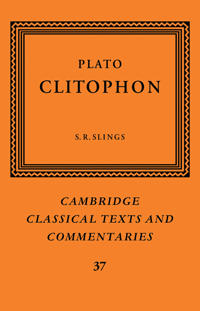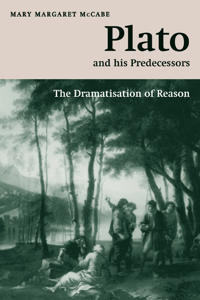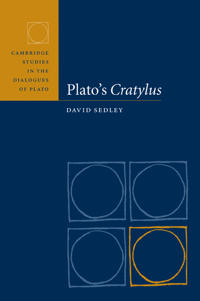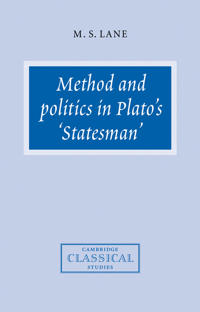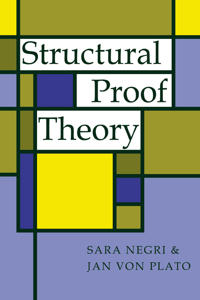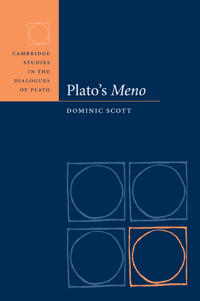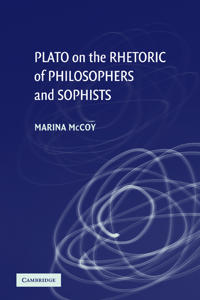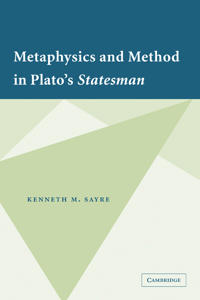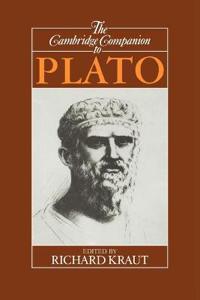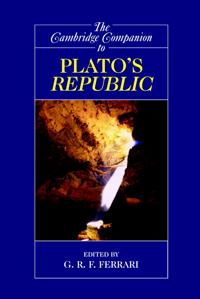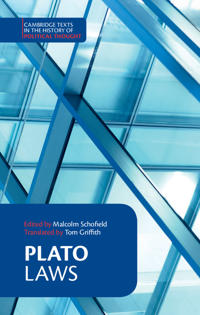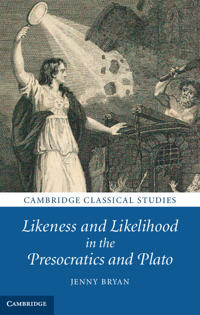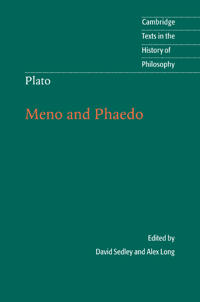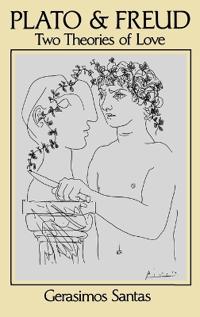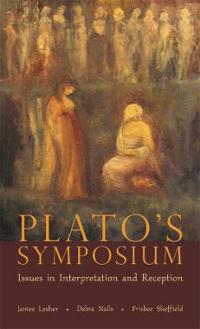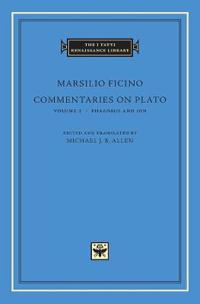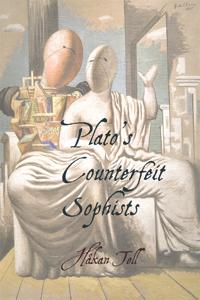Berkeley Plato, The: From Neglected Relic to Ancient Treasure, an Archaeological Detective Story (Övrig)
avStephen G. Miller
ISBN: 9780520258334 - UTGIVEN: 2009-11-04This book explores the provenance of the so-called Berkeley Herm of Plato, a sculptural portrait that Stephen G. Miller first encountered over thirty years ago in a university storage basement. The head, languishing since its arrival in 1902, had become detached from the body, or herm, and had been [...]
Plato: Clitophon
ISBN: 9780521031066 - UTGIVEN: 2006-11The Clitophon, a dialogue generally ascribed to Plato, is significant for focusing on Socrates' role as an exhorter of other people to engage in philosophy. It was almost certainly intended to bear closely on Plato's Republic and is a fascinating specimen of the philosophical protreptic, an importan[...]
Plato and His Predecessors (Pocket)
avMary Margaret McCabe
ISBN: 9780521033794 - UTGIVEN: 2007-04How does Plato view his philosophical antecedents? Plato and his Predecessors considers how Plato represents his philosophical predecessors in a late quartet of dialogues: the Theaetetus, the Sophist, the Politicus and the Philebus. Why is it that the sophist Protagoras, or the monist Parmenides, or[...]
Plato's "Cratylus" (Häftad)
avMary Margaret McCabe
ISBN: 9780521034029 - UTGIVEN: 200709Plato's Cratylus is a brilliant but enigmatic dialogue. It bears on a topic, the relation of language to knowledge, which has never ceased to be of central philosophical importance, but tackles it in ways which at times look alien to us. In this reappraisal of the dialogue, Professor Sedley argues t[...]
Method and Politics in Plato's Statesman
ISBN: 9780521036870 - UTGIVEN: 2007-05Among Plato's works, the Statesman is usually seen as transitional between the Republic and the Laws. This book argues that the dialogue deserves a special place of its own. Whereas Plato is usually thought of as defending unchanging knowledge, Dr Lane demonstrates how, by placing change at the hear[...]
Structural Proof Theory (Pocket)
avSara Negri, Jan Von Plato, Aarne (CON) Ranta
ISBN: 9780521068420 - UTGIVEN: 2008-07Structural proof theory is a branch of logic that studies the general structure and properties of logical and mathematical proofs. This book is both a concise introduction to the central results and methods of structural proof theory, and a work of research that will be of interest to specialists. T[...]
Cambridge Studies in the Dialogues of Plato (häftad)
ISBN: 9780521104685 - UTGIVEN: 2009-03Given its brevity, Plato's Meno covers an astonishingly wide array of topics: politics, education, virtue, definition, philosophical method, mathematics, the nature and acquisition of knowledge and immortality. Its treatment of these, though profound, is tantalisingly short, leaving the reader with [...]
Plato and the Art of Philosophical Writing (Häftad)
ISBN: 9780521131261 - UTGIVEN: 2010-02Plato's dialogues are usually understood as simple examples of philosophy in action. In this book Professor Rowe treats them rather as literary-philosophical artefacts, shaped by Plato's desire to persuade his readers to exchange their view of life and the universe for a different view which, from t[...]
Plato on the Rhetoric of Philosophers and Sophists (Häftad)
avMarina McCoy
ISBN: 9780521175371 - UTGIVEN: 2011-03Marina McCoy explores Plato's treatment of the rhetoric of philosophers and sophists through a thematic treatment of six different Platonic dialogues, including Apology, Protagoras, Gorgias, Republic, Sophist, and Phaedras. She argues that Plato presents the philosopher and the sophist as difficult [...]
Philosophical Religions From Plato To Spinoza (Inbunden)
avCarlos Fraenkel
ISBN: 9780521194570 - UTGIVEN: 2012-11-22This groundbreaking account of the concept of a philosophical religion traces its history from antiquity to the Enlightenment.[...]
Metaphysics and Method in Plato's Statesman
ISBN: 9780521349628 - UTGIVEN: 2011-07At the beginning of his Metaphysics, Aristotle attributed several strange-sounding theses to Plato. Generations of Plato scholars have assumed that these could not be found in the dialogues. In heated arguments, they have debated the significance of these claims, some arguing that they constituted a[...]
The Cambridge Companion to Plato (Häftad)
ISBN: 9780521436106 - UTGIVEN: 1992-10Plato stands as the fount of our philosophical tradition, being the first Western thinker to produce a body of writing that touches upon a wide range of topics still discussed by philosophers today. In a sense he invented philosophy as a distinct subject, for although many of these topics were discu[...]
Plato
ISBN: 9780521447782 - UTGIVEN: 1995-03The Statesman is Plato?s neglected political work, but it is crucial for an understanding of the development of his political thinking. In its presentation of the statesman?s expertise, The Statesman modifies, as well as defending in original ways, this central theme of the Republic. This new transl[...]
Plato: Gorgias, Menexenus and Protagoras
ISBN: 9780521546003 - UTGIVEN: 2009-12Presented in the popular Cambridge Texts format are three early Platonic dialogues in a new English translation by Tom Griffith that combines elegance, accuracy, freshness and fluency. Together they offer strikingly varied examples of Plato's critical encounter with the culture and politics of fifth[...]
The Cambridge Companion to Plato's Republic (Pocket)
avG. R. F. (EDT) Ferrari
ISBN: 9780521548427 - UTGIVEN: 2007-06This Companion provides a comprehensive account of this outstanding work, which remains among the most frequently read works of Greek philosophy, indeed of Classical antiquity in general. The sixteen essays, by authors who represent various academic disciplines, bring a spectrum of interpretive appr[...]
Plato
ISBN: 9780521676779 - UTGIVEN: 2010-12Plato's Meno and Phaedo are two of the most important works of ancient western philosophy and continue to be studied around the world. The Meno is a seminal work of epistemology. The Phaedo is a key source for Platonic metaphysics and for Plato's conception of the human soul. Together they illustrat[...]
Plato: Laws (häftad)
ISBN: 9780521676908 - UTGIVEN: 2016-09Plato's Laws is one of the most important surviving works of ancient Greek political thought. It offers sustained reflection on the enterprise of legislation, and on its role in the social and religious regulation of society in all its aspects. Many of its ideas were drawn upon by later political th[...]
Plato: The Symposium (Häftad)
ISBN: 9780521682985 - UTGIVEN: 2008-04Plato's Symposium, written in the early part of the 4th century BC, is set at a drinking party (symposium) attended by some of the leading intellectuals of the day, including Aristophanes, the comic dramatist, Socrates, Plato's mentor, and Alcibiades, the brilliant but (eventually) treacherous polit[...]
Likeness and Likelihood in the Presocratics and Plato (Inbunden)
avJenny Bryan
ISBN: 9780521762946 - UTGIVEN: 2011-12The Greek word eoikos can be translated in various ways, being used to describe similarity, plausibility or even suitability. This book explores the philosophical exploitation of its multiple meanings by three philosophers, Xenophanes, Parmenides and Plato. It offers new interpretations of the way t[...]
Plato (Inbunden)
avDavid Sedley
ISBN: 9780521859479 - UTGIVEN: 201011Plato's Meno and Phaedo are two of the most important works of ancient western philosophy and continue to be studied around the world. The Meno is a seminal work of epistemology. The Phaedo is a key source for Platonic metaphysics and for Plato's conception of the human soul. Together they illustrat[...]
Plato and Freud
ISBN: 9780631159148 - UTGIVEN: 1988-04What is love? Why do we idealize those whom we love? How do we choose whom to love? Are some kinds of love better than others? Each age returns to these questions with renewed perplexity. Gerasimos Santas examinees the two greatest theoretical architectures of love, side by side. It provides a thoro[...]
A History of Literary Criticism: From Plato to the Present (Inbunden)
avM. A. R. Habib
ISBN: 9780631232001 - UTGIVEN: 2005-10-31Plato's Symposium
ISBN: 9780674023758 - UTGIVEN: 2007-03In his "Symposium", Plato crafted a set of speeches in praise of love that has influenced writers and artists from antiquity to the present. Early Christian writers read the dialogue's 'ascent passage' as a vision of the soul's journey to heaven. Ficino's commentary on the "Symposium" inspired poets[...]
Commentaries on Plato (Inbunden)
avMarsilio Ficino
ISBN: 9780674031197 - UTGIVEN: 200812Marsilio Ficino (1433-1499), the Florentine scholar-philosopher-magus, was largely responsible for the Renaissance revival of Plato. The publication of his Latin translations of the dialogues in 1484 was an intellectual event of the first magnitude, making the Platonic canon accessible to western Eu[...]
Plato's Counterfeit Sophists (Häftad)
avHakan Tell
ISBN: 9780674055919 - UTGIVEN: 2011-05This book explores the place of the sophists within the Greek wisdom tradition, and argues against their almost universal exclusion from serious intellectual traditions. By studying the sophists against the backdrop of the archaic Greek institutions of wisdom, it is possible to detect considerable i[...]


